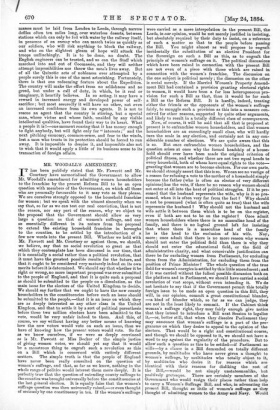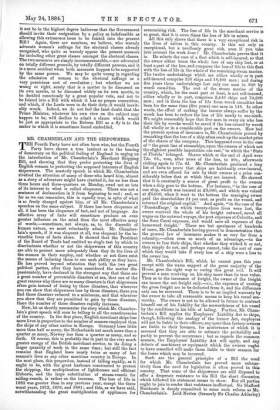MR. WOODALL'S AMENDMENT.
IT has been publicly stated that Mr. Fawcett and Mr. Courtney have memorialised the Government to allow Mr. Woodall's amendment for admitting women householders to the franchise by the present Reform Bill to be an open question with members of the Government, on which all those who are personally favourable to it may vote as they please. We are ourselves strongly opposed to the household franchise for women ; but we speak with the utmost sincerity when we say that, so far as we can test our real conviction, that is not the reason, nor any part of the reason, why we object to the proposal that the Government should allow so very large a question as that of women's suffrage, and one so essentially different in its nature from the proposal to extend the existing household franchise in boroughs to the counties, to be settled by the introduction of a few new words into the present Bill. Whether we held with Mr. Fawcett and Mr. Courtney or against them, we should, we believe, say that no social revolution so great as that which they contemplate has been discussed in our time, that it is essentially a social rather than a political revolution, that it must have the greatest possible results for the future, and that it ought to be considered very maturely indeed on its own merits before it is determined. We should say that whether it be right or wrong, no more important proposal was ever submitted to the people of England, and that it is quite such a proposal as should be submitted to the people on a dissolution, as the main issue for the electors of the United Kingdom to decide. We should say further that we ought to have the new county householders in the constituencies before such an issue should be submitted to the people,—that it is an issue on which they are as deeply interested as any other class in the United Kingdom, and that to settle it by a sort of political parenthesis before these two million electors have been admitted to the vote, would be very unfair indeed to them. And this, of course, we say without having any better means of knowing how the new voters would vote on such an issue, than we have of knowing how the present voters would vote. So far as we know ourselves, if we were as deeply convinced as is Mr. Fawcett or Miss Becker of the simple justice of giving women votes, we should yet say that it would be a monstrous thing to engraft such a revolution as this on a Bill which is concerned with entirely different matters. The simple truth is that the people of England have never been really consulted on the question of women's suffrage, and that, as far as we know, nothing in the whole range of politics would interest them more deeply. It is perfectly true that the question of extending county suffrage to the counties was brought universally before the constituencies at the last general election. It is equally false that the women's suffrage question was then universally raised,—or even thought of seriously by one constituency in ten. If the women's suffrage
were carried as a mere interpolation in the present Bill, the Lords, in our opinion, would be not merely justified in insisting, but absolutely required by their duty to insist, on a reference of such a matter as that to the people before passing the Bill. You might almost as well propose to engraft incidentally the substitution of an elective President for the Sovereign on such a Bill as this, as to engraft the principle of women's suffrage on it. The political discussions which have been raised in connection with the present Bill are not even of a piece with those which are raised in connection with the women's franchise. The discussion on the one subject is political merely ; the discussion on the other is social merely. If the Married Women's Property Amend- ment Bill had contained a provision granting electoral rights to women, it would have been a far less heterogeneous pro- vision for such a Bill as that, than it would be for such a Bill as the Reform Bill. It is hardly, indeed, treating either the friends or the opponents of the women's suffrage fairly, to smuggle such a provision as this into a measure con- ceived for other reasons, supported by quite other arguments, and likely to result in a totally different class of consequences.
Now, of course, it will be said that all that is proposed at present is to enfranchise women householders, and that women householders are an exceedingly small class, who will hardly turn the scale in any election, and certainly not in any con- siderable number of elections. We are quite aware that this is so. But once enfranchise women householders, and the question arises at once why the formal headship of a house- hold should ever have been made the original criterion of political fitness, and whether there are not two equal heads to every household, both of whom have equal rights to the vote— granting that women are to become electors. For our own parts, we should strongly assert that this is so. We can see no vestige of a reason for refusing a vote to the mother of a household simply because the father (who is often an elector of very different opinions) has the vote, if there be no reason why women should not enter at all into the heat of political struggles. If it be pre- sumed that the husband represents the wife, why is it so pre- sumed, when it is often very far from the fact ? Why should it not be presumed (what is often quite as true) that the wife represents the husband ? Why should not the husband and wife settle it between them which is to be on the register, even if both are not to be on the register ? Once admit women householders where there is no masculine head of the family, and there is no logical groand left for insisting that where there is a masculine head of the family he is the head to the exclusion of his wife. Nay, more ; once admit that there is no more reason why women should not enter the political field than there is why they should not enter the educational field, or the field of administrative charity, and what conceivable justification can there be for excluding women from Parliament, for excluding them from the Administration, for excluding them from the position of Prime Minister ? The whole question of the true field for women's energies is settled by this little amendment; and if it was carried without the fullest possible discussion both on the platform and in Parliament, we should have carried a social revolution of vast scope, without even intending it. We do not hesitate to say that if the Government permit this totally foreign issue to be made an open question in this Bill, they will, in our opinion, commit a great constitutional blunder, —a kind of blunder which, so far as we can judge, they are not in the least likely to commit. If the Cabinet think woman's suffrage right, they may fairly enough give notice that they intend to introduce a Bill next Session to legalise it,—or, better still, that when they dissolve Parliament they may announce that woman's suffrage is a part of the pro- gramme on which they desire to appeal to the opinion of the electors. That would be a right and constitutional course, and though we should be opposed to it, we should not have a word to say against the regularity of the procedure. But to allow such a question as this to be settled—if Parliament so wills—by a clause in a Bill demanded on totally different grounds, by multitudes who have never given a thought to woman's suffrage, by multitudes who totally object to it, by multitudes who desire it for reasons which are identical with their reasons for disliking the rest of the Bill,—would be not simply unstatesmanlike, but positively grotesque. There are certainly members of the Government who would resign their places rather than help to carry a Women's Suffrage Bill, and who, in advocating the present Bill, thought as little of women's suffrage as they thought of admitting women to the Army and Navy. Would it not be in the highest degree ludicrous that the Government should invite their resignation by a policy so indefensible as allowing this extraneous issue to be foisted into the present Bill I Again, there are numbers, we believe, who warmly advocate women's suffrage for the electoral classes already recognised, who quite as warmly oppose the present measure for including other great classes amongst the electoral classes. The two measures are simply incommensurable,—are advocated on totally different grounds, by totally different persons, and it is a mere accident when both measures happen to be supported by the same person. We may be quite wrong in regarding the admission of women to the electoral suffrage as a very pernicious sort of revolution ; but whether we are wrong or right, surely that is a matter to be discussed on its own merits, to be discussed widely on its own merits, to be decided consciously by a great popular vote, and not to be foisted into a Bill with which it has no proper connection, and which, if the Lords were to do their duty, it would inevit- ably wreck. Indeed, we do not feel the least doubt that the Prime Minister, whatever his own view on the subject may happen to be, will decline to admit a clause which would be just as appropriate to the Reform Bill as a fly is to the amber in which it is sometimes found embedded.

































 Previous page
Previous page